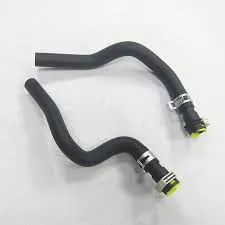brake line tubing
ធ្នូ . 07, 2024 02:46 Back to list
brake line tubing
Understanding Brake Line Tubing Essential Information for Vehicle Safety
When it comes to vehicle maintenance and safety, one often-overlooked component is the brake line tubing. This crucial part of the braking system plays a vital role in ensuring that the brakes function properly, allowing drivers to maintain control and stop safely. In this article, we will explore what brake line tubing is, its types, materials, and maintenance tips to keep your vehicle in top condition.
What is Brake Line Tubing?
Brake line tubing, often simply referred to as brake lines, is a series of tubes and hoses that transport brake fluid from the master cylinder to the brake calipers or wheel cylinders. When you press the brake pedal, hydraulic pressure is generated in the master cylinder, which propels brake fluid through these tubes. This pressure is what ultimately engages the brakes at each wheel, slowing or stopping the vehicle.
The performance of the braking system is heavily reliant on the integrity of the brake line tubing. If these lines are compromised—whether due to wear and tear, corrosion, or physical damage—the result can be disastrous, leading to brake failure and potential accidents.
Types of Brake Line Tubing
There are generally two types of brake line tubing—metal and flexible hoses.
1. Metal Brake Lines Typically made from either steel or copper-nickel alloys, metal brake lines are designed for durability and resistance to corrosion. Steel lines are the most common due to their strength and relatively low cost, but they are more prone to rust and deterioration over time. In contrast, copper-nickel alloy lines offer better corrosion resistance and are less susceptible to rust, making them a preferred choice for many mechanics.
2. Flexible Brake Hoses These are made from rubber or reinforced synthetic materials and are designed to withstand the movement and flexing that occurs during braking. Flexible hoses are particularly essential in areas where movement is expected, such as between the vehicle's body and the suspension components. While they can deteriorate due to heat and environmental conditions, they are crucial for maintaining effective brake operation.
brake line tubing

Common Issues with Brake Line Tubing
As with any vehicle component, brake line tubing can develop problems over time. Here are some common issues to watch for
- Corrosion Particularly prevalent in areas where salt is used during winter months, corrosion can eat away at metal lines, causing leaks. - Cracks and Tears Flexible hoses can develop cracks or tears, especially if they have not been replaced in many years. This can lead to brake fluid leaks, which will directly impact brake performance. - Loose Connectors Sometimes the connections to the brake lines can become loose, resulting in fluid leakage.
Maintenance and Inspection
Regular inspection of your brake line tubing is essential for ensuring the safety and reliability of your vehicle. Here are a few maintenance tips
- Visual Inspection Check for signs of wear, rust, or leaks in both metal lines and flexible hoses. Look out for any fluid spots on the ground where the vehicle is parked. - Professional Checks During routine maintenance, ask your mechanic to inspect the brake lines specifically. They can identify hidden issues that may not be visible during a casual inspection. - Replacement If any corrosion, damage, or leaks are detected, it's crucial to replace the affected lines or hoses immediately. Waiting too long can lead to brake failure.
Conclusion
Understanding brake line tubing is vital for vehicle safety. This small but crucial component ensures that your vehicle's braking system functions effectively, helping you avoid potential accidents. Regular maintenance and inspection are key to keeping your brake lines in good condition. By prioritizing the health of your brake tubing, you're not just enhancing your vehicle's performance—you're also safeguarding your life and the lives of others on the road. Always remember safety first!
